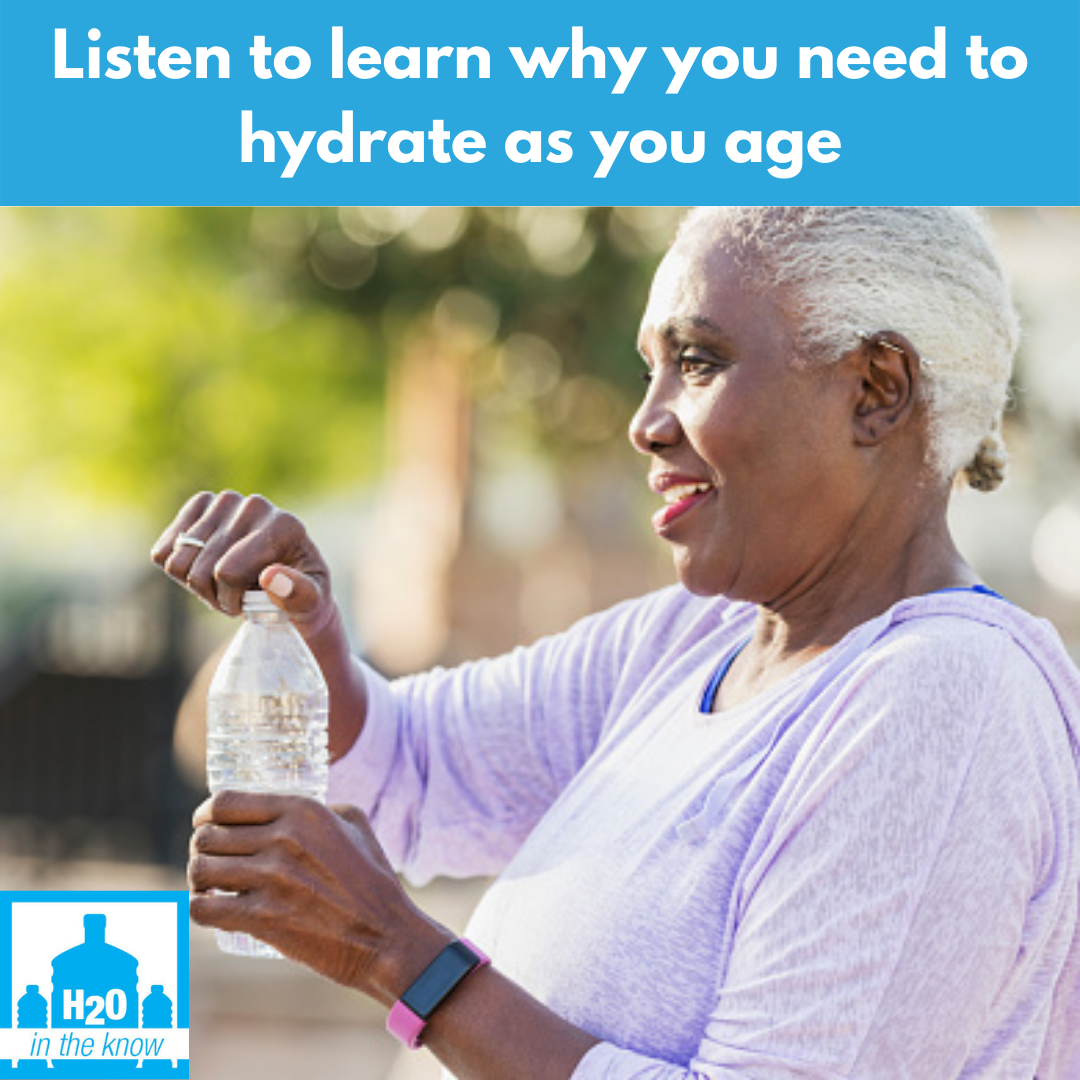International Bottled Water Association | News Release | July 5, 2022
Podcast explores connection between drinking water and healthy aging
 Alexandria, VA – Scientists continue to produce new and impressive research showing the importance of drinking water, especially as we age. In the latest episode of the “H2O In The Know” podcast, Evan Johnson, PhD, an associate professor in the Division of Kinesiology and Health at the University of Wyoming, discusses results from his resent research that highlight the benefits of healthy hydration for seniors.
Alexandria, VA – Scientists continue to produce new and impressive research showing the importance of drinking water, especially as we age. In the latest episode of the “H2O In The Know” podcast, Evan Johnson, PhD, an associate professor in the Division of Kinesiology and Health at the University of Wyoming, discusses results from his resent research that highlight the benefits of healthy hydration for seniors.
While how much water a person should drink is a moving target, based on factors such as physical activity, climate, and caloric intake, Dr. Johnson provides insight into why it’s critically important to establish a healthy hydration habit early, as consistent, adequate hydration can have a positive impact on the aging process. Dr. Johnson says children who have parents that hydrate with water are more likely to continue the healthy habit into adulthood.
“If the [hydration] habits are already in place, then the likelihood that you’ll continue to meet the [intake] guidelines at an older age is better,” Dr. Johnson says.
Because it is natural for our thirst sensation to decrease around age 60, Dr. Johnson says individuals who prioritize water consumption will see benefits to their overall health. And for those with conditions such as diabetes or kidney disease, drinking water can help mitigate the impact of those health issues, he says.
Common questions within the public discourse about hydration are how much water should a person drink per day and how can water intake be tracked? Dr. Johnson has a simple recommendation for measuring hydration status: “For most people, the best thing to do is look at your urine color on a normal basis, and track that. And when you see that urine color darken, well, that’s a great hint that says, ‘Ok, in the next 2-12 hours, I’m going to want to increase my water intake a little bit.’”
The National Academy of Medicine (NAM) and the European Food Safety Authority (EFSA) recommend female adults (including elderly) consume between 2.0 liters (EFSA) and 2.7 liters (NAM) of total water each day, while male adults consume 2.5 to 3.7 liters. Infants aged 6 to 12 months can consume 0.8 to 1 liter per day; young children are advised to drink 1.1 to 1.7 liters (depending on age); and teenagers are encouraged to consume 1.9 to 3.3 liters (depending on age and gender). Total water includes plain water, beverages, and water from the foods you eat. Read more about the NAM and EFSA guidelines at https://bottledwater.org/how-much-water-should-i-drink-a-day/.
This episode, and all others of the “H2O In The Know” podcast, are currently available on Apple Podcasts, Google Podcasts, Spotify, Stitcher, SoundCloud, and www.bottledwater.org.
“H2O In The Know” is a part of the International Bottled Water Association’s (IBWA) diverse collection of communication tools used to provide the public with the facts about healthy hydration and the bottled water industry. IBWA has a robust social media presence (e.g., Facebook, Twitter, Instagram, and Pinterest); an award-winning industry magazine; and a YouTube channel, which has more than 1,300,000 views.
You can find more facts and information about bottled water at www.bottledwater.org.
###
Media Contact:
Jill Culora
jculora@bottledwater.org
703.647.4609
The International Bottled Water Association (IBWA) is the authoritative source of information about all types of bottled waters, including spring, mineral, purified, artesian, and sparkling. Founded in 1958, IBWA’s membership includes U.S. and international bottlers, distributors and suppliers. IBWA is committed to working with the U.S. Food and Drug Administration (FDA), which regulates bottled water as a packaged food product, to set comprehensive and stringent standards for safe, high-quality bottled water products.
In addition to FDA regulations, IBWA member bottlers must adhere to the IBWA Bottled Water Code of Practice, which mandates additional standards and practices that in some cases are more stringent than federal and state regulations. A key feature of the IBWA Bottled Water Code of Practice is a mandatory annual plant inspection by an independent, third-party organization.
